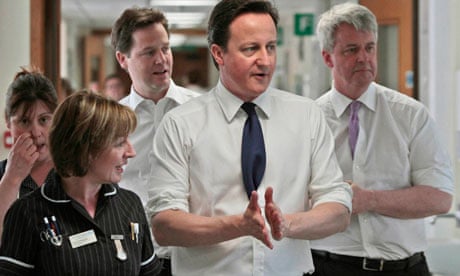Andrew Lansley's controversial NHS bill is premised on "choice and competition" and the creation of a market in healthcare. These three stories below from the US show choice and competition at work on the ground. They also explain why 45,000 Americans die every year because they can't afford – and in many cases can't even obtain – health insurance.
But first, let me introduce myself – as I did in June 2009 when I testified before a congressional committee that was investigating the many abuses of the private insurance industry in the US. "My name is Wendell Potter, and for 20 years I worked as a senior executive at health insurance companies, and I saw how they confuse their customers and dump the sick – all so they can satisfy their Wall Street investors."
I described how insurance companies, in their constant quest to meet profit expectations, routinely cancel the coverage of sick policyholders and strive to spend less and less of premium dollars on medical care so they can divert more and more of those dollars to executive salaries and dividends for investors.
A few months before my testimony I had left my job as head of communications for one of the largest US insurers, Cigna. I could no longer in good conscience continue to serve as a spokesman for a profit-obsessed industry that I had come to realise was largely responsible for the American healthcare system's descent into dysfunctionality.
Last month a man in North Carolina was arrested for robbing a bank for $1 so he could get government-provided healthcare in prison. Richard James Verone, 59, has a tumour in his chest and two ruptured discs but, like 51 million Americans, no job or health insurance. Verone told reporters he asked for only a dollar to show that his motives were medical, not monetary. Because of his "pre-existing" conditions, no private insurer would have anything to do with him. He wasn't poor enough to qualify for Medicaid – the government programme for low-income Americans – or old enough to qualify for Medicare, for those aged 65 and over.
Verone and millions of Americans with a history of illness are considered "uninsurable" by private insurers. Even non-profit insurers refuse to sell coverage to a third or more of Americans who apply because they have been sick in the past. Of those they turn down, many are children born with birth defects.
Shortly after Verone staged his robbery, a contestant in the Miss USA pageant revealed during a nationally broadcast interview that she is homeless. Why? Her sick mother could not pay both the rent and her mounting medical bills, so 23-year-old Blair Griffith was evicted with her mother and brother just weeks after winning the title of Miss Colorado.
Griffith's mother, a widow, lost her health insurance soon after suffering a severe heart attack. She was unable to get another policy. Debt collectors were relentless in pursuing money she owed for her medical care. She and her children eventually had no choice but to join the millions of Americans who are homeless because they can't pay their medical bills.
The third story hasn't made headlines. A few days ago a young rape victim sent me an email to ask if I might be able to help her find insurance. Unfortunately there is little that I or a broker, or anyone else for that matter, can do to help her get the coverage and access to care she needs. She is a victim not just of rape, but also of an unjust system that has devolved into dysfunction.
There are millions of other other stories, many of which are just as maddening and heartbreaking. And so it is alarming to see David Cameron and his health secretary being sold the "choice and competition" bill of goods by American insurers and other healthcare companies that have made the US system the most expensive and one of the most inequitable on the planet.
Competition sounds good in theory – but in practice, especially among hospitals, it has fuelled rather than contained medical inflation. US hospitals spend billions of dollars needlessly to obtain the latest technology and equipment just so they can compete with other hospitals in the same market.
This has led to a costly duplication of services and a kind of healthcare "arms race". It has not led to better outcomes or equal access to care. Lansley's proposals for the NHS are to privatise and commercialise funding and delivery. The new structures and funding mechanisms are modelled on those of the US healthcare industry. In abolishing the duty to secure and provide comprehensive healthcare for all, he is abolishing the NHS – the envy of American citizens.
The bill will replace the NHS with insurance structures – GP commissioning consortiums/clusters, which under current plans will have discretion to redefine what is NHS care and introduce charges, insurance fees and top-up fees, as well as to contract commercial companies and other American insurers. The US department of justice has indicted many of those companies for fraud, embezzlement and denial of care. And many of these same companies are now hustling and lobbying the UK government for business. The denial of care is commonplace in the US. It need not happen in the UK.
